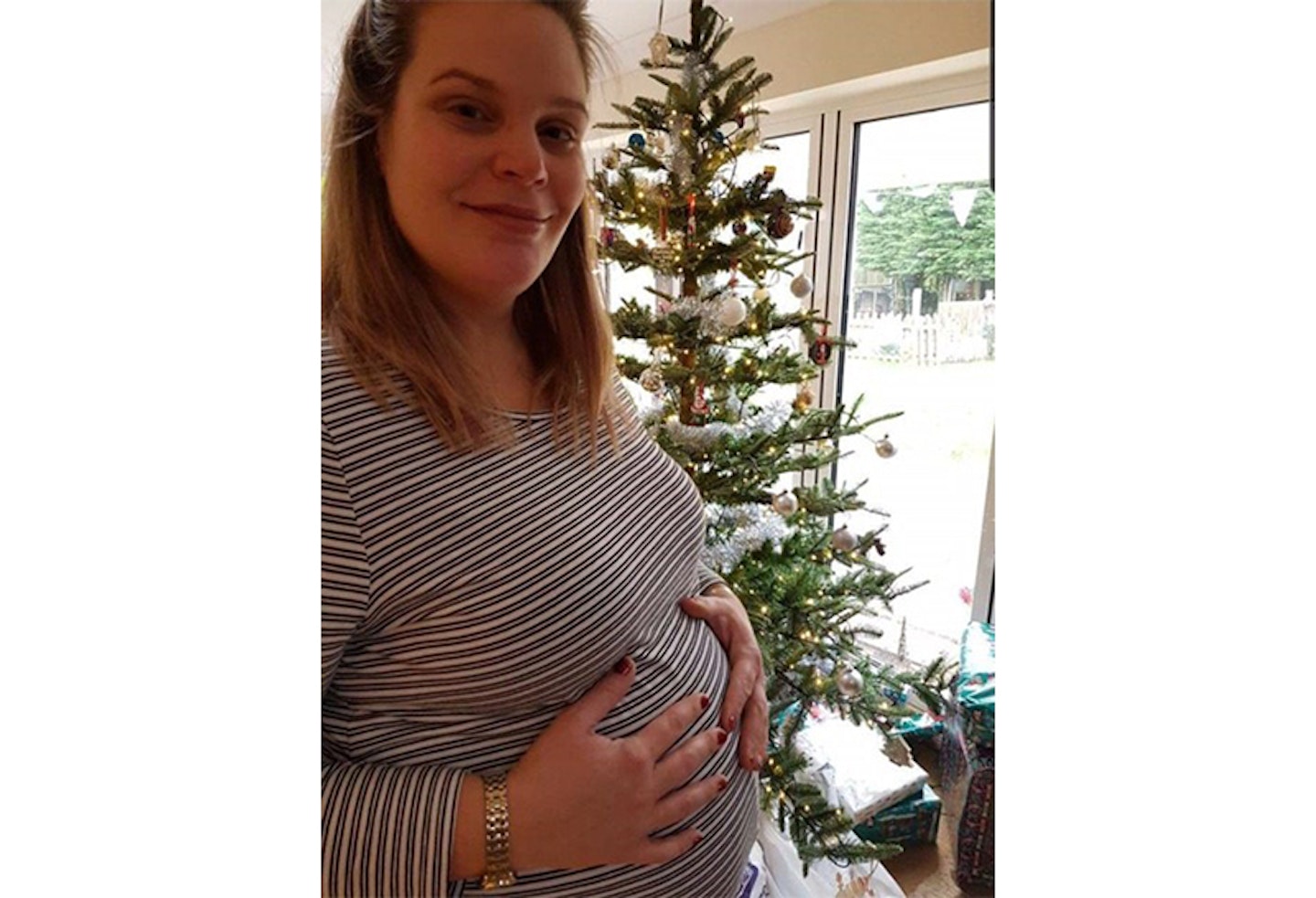Surrogacy is a pathway a lot of couples choose on their journey to parenthood when making a baby in the conventional way isn't as easy or possible, and knowing about how surrogacy works can support your own journey or someone you know.
If an individual or couple who are unable or struggling to conceive or are unable to carry a child themselves, surrogacy is often a recommended route to take to parenthood. Surrogacy is where a woman, often a friend or family member, will carry a baby instead.
Surrogacy is also a way to parenthood for same sex couples or trans couples.
There are a few ways in which surrogacy can be carried out:
Traditional surrogacy is when the surrogate inseminates herself. This can be done with or without medical intervention.
Gestational surrogacy is when the surrogate acts like an incubator. The couple goes through IVF and the surrogate has the embryo implanted into the surrogate, but the embryo isn't genetically related to the surrogate.
If the intended parents (IP's) are looking at using an egg donor for their surrogacy, the surrogate can sometimes use their own eggs if that's something they're comfortable with.
If surrogacy is something you're beginning to consider, you'll want to do as much research as possible before you start making the first steps on your surrogacy journey.
To help answer your questions, we spoke to four surrogates from surrogacy agency, Brilliant Beginnings, Laura, T, Alyssa and Tracey to find out more about their surrogacy journeys and the surrogacy process in the UK.
Meet the surrogates
Laura
Laura began surrogacy in 2012 after she’d finished having her own children. She felt like she could do pregnancy again, but had no plans to bring up any more children of her own. She's been a surrogate three times with four babies - a boy in 2014, their brother in 2016, and in 2020 twin girls for a same sex couple.

T
T offered to help one of her brothers and his wife to conceive as she felt it was easy to carry a baby. Then it occurred to her - if she could help her brother, why couldn’t she help others? So she decided to do her research into surrogacy. She delivered twins in 2017 after a couple of failed cycles.
"By the third cycle, the intended parents were running low on embryos so we did a double transfer and both of them took so I carried a boy and girl for them. Now I’m 36 weeks pregnant with a singleton for a different couple."

Alyssa
Alyssa was first a surrogate in the US. She had a friend struggling with endometriosis and realised there are so many people struggling to carry their own baby. She did her second surrogacy in the UK with Brilliant Beginnings.
"I don’t love being pregnant but I don’t mind it. My first surrogacy was with twins for a same sex couple from France who came to America. My second was using my egg. I had three miscarriages with this couple and so I offered to use my eggs after that. We tried again and we got a baby girl delivered mid-covid!"

Tracey
Before becoming a surrogate, Tracey was an egg donor for her friend.
"It was the clinic who spoke to me about the possibility of surrogacy, and when I was researching it, it was more a question of why wouldn’t I do this rather than why would I? Pregnancy isn’t easy for me, I’m very sick, but we do it for the end result to be able to help a couple have a family."

Surrogacy questions:
Do you ever feel the urge to keep the baby you carried?
Alyssa: "I honestly could not imagine keeping the baby that I've had for them. It wouldn’t even enter our minds to keep their baby. The mum of the baby I had is very open that the egg is mine. The whole family knows and she’s been very honest. When she grows up she’ll know that her Auntie Lyssa carried her and that’s her story."
Laura: "The bond that you make during the surrogacy journey is with the IP's (intended parents) and not the baby. It’s a different kind of bond with the baby. It’s a similar bond that you have with your friends' children or your nieces and nephews, there is that distance, but the main bond is the friendship you have with their parents."
How did your family react to you becoming a surrogate?
Laura: "When I first started looking into surrogacy, it was my mum who was on the fence with it. I’m a single mum, so I’ve done these journey’s with support from my family and daughters who are really proud of me. With my mum it did take a bit of education. I first took her to a conference to show her what I know, and actually, she came away from that day with a much better understanding."
T: "Once I’d taken that year to do all of my research and work out that this is something I really want to do, at the point I approached my partner and said that this is something I want to do, that’s kind of code in our house that it’s happening and my partner is absolutely wonderful. Having his support means that having discussions with wider family like in-laws and my extended family has been so much easier to be able to inform them.
"Everybody will get the ‘are you giving away your baby?’ and you could choose to take that as a negative comment or you could choose to take it as an opportunity to inform them on the realities of surrogacy and what it actually involves to turn it into a really positive conversation because they will then take that forward and educate others."
Alyssa: "I’ve had very different reactions to me being a surrogate. My mum will literally stop people in the grocery store and tell them how proud she is that her daughter is a surrogate, and she’ll ask if anyone knows anyone who is looking for a uterus to rent! Vs my kids, who are fine with it as long as I don't bring another baby home. With my last pregnancy being a genetic half sibling to my kids, it was important for my kids to know about it and know that if they ever want to say hi that’s great, but the only thing they cared about is that the baby wasn’t going to keep them up all night!"
Tracey: "For me, I was a little bit apprehensive about how people were going to take it initially, but I’ve had very supportive reactions. I have four girls myself, and it was how they took to it which was so amazing. For them, being children, they were very sort of black and white with it and they had the idea that ‘mummy’s doing this because she has a tummy that works but the intended mother has a tummy that doesn’t work’.
"I have been asked to go into their school and talk about it which was brilliant. I used the example that I was the oven that had to cook the baby and they asked, ‘what happens if you over cook it?’. They look at the baby like they do their younger cousins and although we don’t meet all the time, when we do they all get on so well."
What's the most challenging thing about being a surrogate?

T: "It can be so hard if the cycle doesn't work because you so desperately want to see these people become parents and have all those exciting experiences of the first scan and feel a kick. If you do have cycles that aren’t working it can be really frustrating, and it takes a lot of strength to keep picking yourself back up, but to be honest, I’m yet to meet a surrogate that isn’t extremely stubborn and strong willed!"
How much can surrogacy cost?
Laura: "The cost really depends on what avenue the IP’s intend to go down. Although at this time, Brilliant Beginnings only supports gestational surrogacy, the traditional route does bring some advantage where cost is a factor. For a set of IP's going down a more traditional route with home insemination, would be less expensive than having to use a clinic to go through IVF.
"Clinic costs are quite an expensive part of the journey. It could be upwards of £15,000 just for a first batch, potentially they might need more and if they also need an egg donor that’s more on top of that. Depending on the agency you go with and the level of support a surrogate needs, it really varies. A decent budget for a UK journey with Brilliant Beginnings, we would always say to factor in around £50,000 and within that is also all your legal support."
What are your relationships like with the intended parents?
Tracey: "After my initial journey, I became so close to the intended parents and it was such a good match that I got really worried that my second match wouldn’t be as good as my first, but we got on just as well and we still keep in touch with both."
Alyssa: "Sometimes you get so close with a couple and all of a sudden they’re so busy with their new baby and it’s kind of like wait - we’ve been chatting everyday for months and all of a sudden it’s stopped, but they’re just new parents and it’s nothing personal.
"I went into surrogacy thinking the main point is to make a family - if I make friends along the way that’s great but if we drift apart at the end that's ok too. But I've been really lucky. I got an update from the twins, they’re 7 now and I have visited them. The mum of the singleton sends me quite a few updates."
What are the benefits of going through an agency like Brilliant Beginnings?
T: "We take a lot of time doing background checks on the surrogate to make sure she is a viable, healthy surrogate, who is likely to have a healthy journey. We take time to get to know what she wants from the surrogacy and that's everything from the type of people she’d like to help, the relationship she’d like to have with the intended parents, her feelings about treatment and pregnancy and delivery - what does this surrogacy look like for her? Then we will guide her, so we will give them counselling sessions to discuss any thoughts or feelings they might have come up during the pregnancy so that they have the headspace to know in their head, how would I react if that were to happen? So that they’re really going into it with their eyes wide open.
"All of our surrogates have a psychological evaluation to make sure we are taking them through safely and to make sure the surrogacy isn’t going to pose any risks in terms of emotions or wellbeing or relationships and that’s really helpful to achieve a really strong match with their IP’s. We’ll also guide them with expenses which can be quite tricky. We’ll never tell them what their expenses are, as every woman’s needs are different, but we are here to offer advice."
Laura: "We don’t have a huge waiting list for IP’s as we like to keep it manageable. There are hundreds and thousands of IP's out there but in order for us to be able to match surrogates and IP's within a reasonable time frame, we do actively keep the numbers to a manageable load.
"We get to know the IP’s really well and we listen to their story to find out what’s brought them to surrogacy in the first place. We talk about their wants and wishes for their journey, the relationship they’d want with their surrogate to just get to know them as individuals.
"Once they’re matched, we support and take them through their journey from treatment through their pregnancy and beyond. We also support them through any legalities so we make sure everyone has had their legal reviews, that their wills are in place, that their life insurance is sorted out. All the hard conversations you have to have and to bring them together. It’s quite tricky to have these conversations with people you’ve just met so to have us there to guide them through these discussions and raise the conversations is really important and lays the foundation of a strong journey."
Alyssa: "Brilliant beginnings does a really good job of taking the time to really get to know the surrogate and IP’s so it’s so easy going on both sides. For me, we had a group chat between me, the IP’s and my partner and we were able to talk all the time."
How much can a surrogate claim in expenses during their pregnancy?

T: "The law isn’t terribly clear when it comes to the topic of expenses. Here in the UK we are altruistic, so people cannot profit from surrogacy and that’s the surrogate and the agencies involved. But it does say that surrogates should have reasonable expenses covered, and what one surrogate needs is very different from another surrogate.
"We’re thinking about things like, covering loss of earnings, covering childcare costs so that the surrogate can go to appointments without feeling rushed or stressed. It’s okay in the UK to pay more than basic expenses. It’s important for the surrogate to feel confident and comfortable that whatever happens, she will be fully financially covered."
How involved can the intended parents be in the surrogate's pregnancy?
Laura: "Everyone is really different and generally they work out their own ways of communicating. There’s an expectation from both parties that they’ll be there for the important steps of the journey.
"One hospital to the next are really different on their policies and procedures when it comes to allowing IP’s into the room at scans, and any further appointments. It is a real hand hold from us through the whole journey to give everyone a positive experience.
"For me, personally, I’m very open and if they wanted to be there throughout labour I’m comfortable with that. I just think being able to share that and for them to be able to go through that with me is something I wanted."
T: "I’ll be honest, there are no plans for the IP’s to be in the room while I labour, but the plan is that they’re really close by. When it’s go time, and it looks like baby is making an appearance, they are more than welcome to come in and experience that. The point in that is to spare them the blushes of labour which can be very noisy and not excluding them from the part that is most magical for them - seeing their baby enter the world. But giving me the freedom to labour in a way that feels very comfortable for me as a woman who has to live with that experience."
What does it take to be a surrogate?
T: "In the UK in terms of requirements, if you are doing a supported journey with an agency, the requirements may change from agency to agency. For us, we’re looking for women over the age of 21 who have had at least one birth or have completed their families and are done with rearing their own children and have closed that chapter.
"Having a healthy lifestyle is also good for both surrogate and baby as well. We’re very risk averse so anything that will contribute to a smooth pregnancy is a positive. In terms of advice, definitely do your research, get more information, ask questions, talk to people and approach all of the UK agencies. No one is going to be upset if you decide not to go with them, but it’s much better to be informed about your options and what kind of support you’d get from each agency to see what fits for you.
"If there is support being offered, don’t turn it down. Take all the support you can get. You should be able to look back on this in years to come and think this is one of the best things I ever did with no regrets or doubts."
Laura: "My advice would be to take as much advice as you can. Know that it’s a real commitment for you and your family and you need to be in the right place to do that. Lots of women do this on their own, which is absolutely a personal choice but there are a lot of women that have done this independently who have looked back and said I wish I knew I maybe would have chosen that way to start with. It's a huge thing you’re going through so if you can have that support on both sides, why wouldn’t you?"
Are surrogates allowed maternity leave?
Laura: "I’m a nurse by trade and during my first journey, I took maternity leave for my own recovery then I was back to work. I think 8-12 weeks is a suitable time for a surrogate to have for their recovery and if that wasn’t covered by work, it would be worked into her expenses."
What changes to surrogacy law need to happen?
T: "One of the key changes people would like to see is that parental responsibility goes directly to the parents at the point of birth rather than the time lag of waiting for the birth registration and parental order, as part of the parental order anyway is that the baby must be living with the parents. Well if they’re living with their parents and the parents are making those day to day decisions, surely it makes sense for that responsibility to be set in stone anyway. I think that’s going to be one of the most positive changes to see in surrogacy law."
Additional surrogacy questions:
Is surrogacy legal?
Surrogacy has always been legal in the UK and the first known surrogate birth happened here in the UK in 1985 when ‘baby Cotton’ was born. No third party should be involved on a commercial basis – ie. receive fees for ‘brokering’ a surrogacy relationship.
Advertising for a surrogate is not allowed, nor is advertising to be a surrogate.
The surrogate can only receive payments to cover expenses she has incurred in being pregnant (for example, clothes, travel expenses and loss of earnings). She cannot be ‘paid’ to be a surrogate.
Surrogacy involves complicated legal issues, so the Human Fertilisation & Embryology Authority (HFEA) recommend you seek legal advice before making any decisions. It is important to know that surrogacy arrangements are unenforceable.
Another option for families is to seek surrogacy through an agency.
Lorna White has been a Digital Writer for Mother&Baby since 2020. She has a keen interest in a range of topics, from potty training and nutrition to baby names and maternity fashion.
